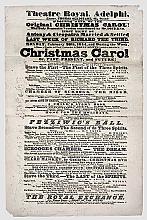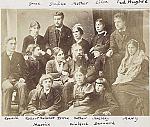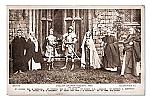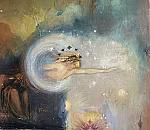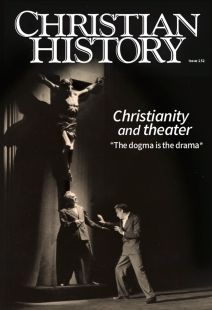Christian History Timeline: Faith and the stage
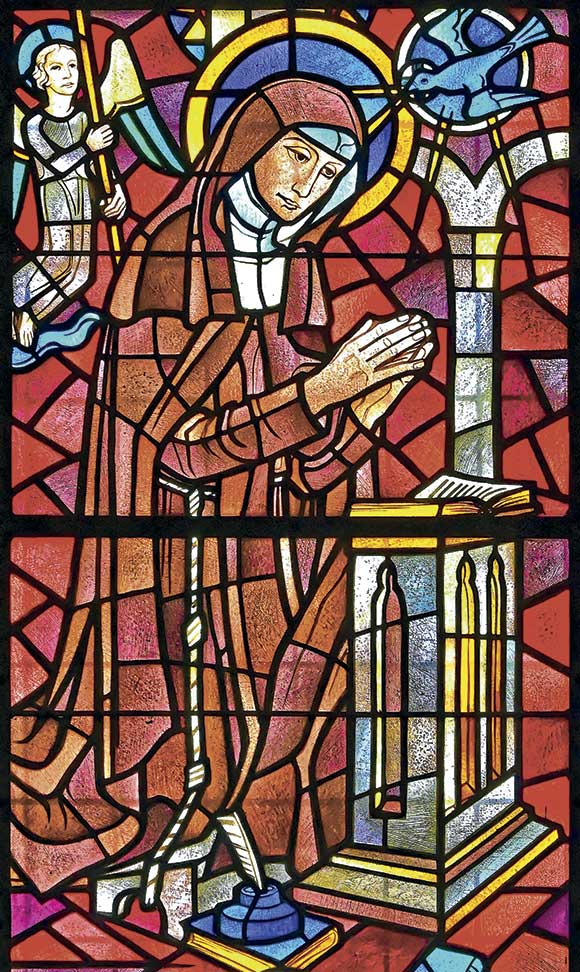
[Thomas Hummel, St. Hildegard of Bingen, side aisle window, c. 1950. St. Nicholas (Koblenz-Arenberg)—Binsfeld company / [CC BY-SA 4.0] Wikimedia Commons]
—c. 200 Tertullian publishes “On the Spectacles,” which argues against Christian participation in pagan entertainment. Clement of Alexandria writes “Exhortations to the Greeks,” which denounces theatrical performances as demonic.
—c. 300s Legalization of Christianity allows liturgical worship to be public.
—348 Prudentius, a Christian Latin poet, is born. He would write the poetic Christian allegory Psychomachia, which becomes highly influential in the Middle Ages.
—c. 397 Augustine writes Confessions, in which he decries theater as a distraction from God.
—c. 400s Quem quaeritis? (Whom Do You Seek?) appears as the best-known precursor to the mystery cycle. Liturgical plays grow in popularity.
—c. 935 Hrotsvitha of Gandersheim, the first recorded woman playwright, is born.
—c. 1151 Hildegard of Bingen writes Ordo Virtutum, an allegorical drama that anticipated the medieval morality play genre by about a century.
—1210 Pope Innocent III forbids clergy from acting on a public stage. Instead craft guilds begin organizing, producing, and performing plays.
—1376 The festival of Corpus Christi in York takes place. By this time pageant wagons and craft guild performances are well established.
—1531 Juan Diego sees “La Morenita,” triggering mass conversions among Indigenous people in Mexico.
—c. 1554 Jane Lumley produces Iphigenia in Aulis as a commentary on the slaughter of her first cousin, Lady Jane Grey.
—c. 1470 Mankinde, one of the earliest and most popular English morality plays, is published.
—1533 John Heywood writes The Play of the Wether in an attempt to influence Henry VIII.
—1536–1538 Protestant John Bale writes a polemical anti-Rome play, King Johan.
—1589 William Shakespeare begins producing his best-known works, which often play on and with religious themes.
—1604 Christopher Marlowe produces Doctor Faustus.
—1613 Elizabeth Tanfield Cary becomes the first woman to publish an original drama in English with The Tragedy of Mariam.
—1632 Puritan William Prynne publishes his famous antitheatrical treatise, Histriomastix.
—1642 As the First English Civil War rages, the Long Parliament orders the closure of all London theaters.
—1660 The restoration of the English monarchy leads to a reinstatement of English theater.
—1678 John Bunyan publishes Pilgrim’s Progress.
—1689 Sor Juana Iñes de la Cruz writes The Divine Narcissus.
—1738 George Whitefield arrives in the American colonies. His theatrical preaching attracts thousands.
—1741 Jonathan Edwards preaches “Sinners in the Hands of an Angry God,” a dramatic sermon often credited for spurring on the First Great Awakening in New England.
—1844 A Christmas Carol enjoys its first theatrical adaptation.
—1877 Louisa MacDonald adapts the second part of Pilgrim’s Progress for the stage. The MacDonald family performs it together until 1889.
—1879 Henrik Ibsen debuts A Doll’s House, setting the stage for modernist dramas.
—1892 Methodist bishop John Heyl Vincent condemns theater as licentious in Better Not.
—1900s Revivalist preachers continue to use dramatic oratory, a preaching style that influences American Christianity into the twenty-first century.
—1909 Clergyman Percy Dearmer helps write the English Church Pageant, which is staged with over 4,000 performers. British pageant plays become huge community events.
—1913 G. K. Chesterton writes Magic.
—1916 An all-Black cast performs Angelina Weld Grimké’s Rachel.
—1920s The Canterbury Festival begins, which features pageant plays by T. S. Eliot, Charles Williams, Dorothy L. Sayers, and more over decades.
—1921 William Butler Yeats writes Calvary, his first passion play.
—1927 James Weldon Johnson publishes God’s Trombones.
—1930 The Green Pastures by Mark Connelly opens on Broadway. England’s modern religious drama movement begins around this time.
—c. 1931 The Inklings begin meeting to discuss works in progress.
—1935 Eliot’s Murder in the Cathedral debuts at the Canterbury Festival.
—1936 Inkling Neville Coghill founds the Experimental Theatre Club.
—1937 Lanston Hughes’s Don’t You Want to Be Free? debuts. Charles Williams begins attending Inklings meetings and writes The House by the Stable.
—1941 BBC begins broadcasting Sayers’s radio drama The Man Born to Be King.
—1953 Inkling J. R. R. Tolkien writes his only play, The Homecoming of Beorhtnoth Beorhthelm’s Son.
—1959 A Raisin in the Sun by Lorraine Hansberry becomes a Broadway smash hit.
—1971 Godspell opens off Broadway.
—1973 Inkling John Wain writes Johnson Is Leaving.
—1974 Jim Young founds Workout, Wheaton College’s theater ensemble.
—1979 Zoot Suit by Luis Valdez debuts on Broadway, launching national recognition of El Teatro Campesino.
—1991 PBS broadcasts La Pastorela: The Shepherd’s Tale on December 23.
—1992 Max McLean founds Fellowship for Performing Arts (FPA).
By The editors
[Christian History originally published this article in Christian History Issue #152 in 2024]
Next articles
“Merry Christmas, Mr. Scrooge”
The story includes references to Jesus as the “Founder” of Christmas
Edwin Woodruff TaitFrom drama to life
George and Louisa MacDonald’s family truly lived the Pilgrim’s Progress
Rachel E. JohnsonWizards’ duels and modernist mayhem
Magic, myth, and Christ in twentieth-century theater
Sørina HigginsSupport us
Christian History Institute (CHI) is a non-profit Pennsylvania corporation founded in 1982. Your donations support the continuation of this ministry
Donate



